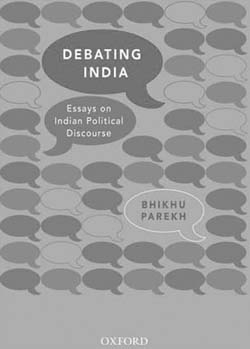India is endowed with a rich philosophical tradition, which dates back to ancient times, a tradition which is also varied along various axes. One of the main concerns of Bhikhu Parekh is to show the richness of this tradition from the perspective of the norms and standards of argumentation within the political and philosophical discourses. His main concern is how standards were maintained when discussion and debate went antagonistic—publicly. Parekh thinks it is worthwhile to investigate this aspect because he is of the opinion that earlier studies, particularly the work of Amartya Sen is not satisfactory enough. Although he agrees with much of Sen’s work in The Argumentative Indian, he ‘departs from him in several respects’. The word ‘argumentative’ in the book is used sometimes ‘in the sense of being methodical in one’s reasoning and weighing up arguments before reaching a conclusion’ and sometimes it seems that it is being used in the negative pejorative sense and in a ‘more common and conventional sense, it refers to someone who argues for the sake of arguing.’ Moreover, Sen does not emphasize the importance of having a tradition of ‘public debate’. Sen only focuses on ‘disagreements between two individual or schools and overlooks the equally and, in some contexts, far more important public debates conducted before large audiences, having formal structure and involving a binging verdict.’ The aim of the book partly is to introduce to the reader the methods in which this public debate took in the ‘Indian tradition’.
The book which is a collection of articles and talks delivered by Parekh, focuses on the political and intellectual thought of Gandhi, Nehru, Tagore and Ambedkar. Most of the articles deal with Gandhian thought, only a selective few deal with other Indian luminaries. Parekh’s reputation as a Gandhian scholar is well established. He touches upon those elements of Gandhian thought which he has not dealt with in his earlier books. Lately, he seems to be reading Ambedkar so he dedicates one essay on Ambedkar and his idea of Fraternity. Since there is limited space in this review, I will focus on select essays particularly where he is not dealing with Gandhi directly.
In the essay titled ‘Indian Traditions of Public Debate’ Parekh gives us a snapshot of the way in which debates and the ethics of debate took place in the Indian tradition. Parekh argues that there are two broad types of debates—namely, tattvanirninisu and vijigisu—the first one concerned with determining the truth and the second one with that of winning the debate. Those engaged in the first were referred to as sabrahmacharin (fellow seekers). The truth seeking debate is also referred to as vada. Even in the Buddhist Pitakas those engaged in Vada in Parkeh’s words ‘put forward their opposite views in an honest search for truth and accepted with humility the truth of the opponents’ position when they were convinced of it.’ He further writes, ‘Faults of others’ arguments were noted and pointed out but not dwelt upon or used to discredit them. ‘This way of debating was considered the best way. What was important to the Indian tradition was the moral character of the debater. Buddhi, a refined intelligence involved far more than tarka, which meant formal reasoning. In other words, ‘epistemology was closely bound up with ethics.’

